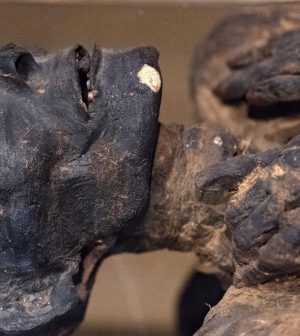- Could Your Grocery Store Meat Be Causing Recurring UTIs?
- Are You Making This Expensive Thermostat Error This Winter?
- Recognizing the Signs of Hypothyroidism
- 10 Strategies to Overcome Insomnia
- Could Artificial Sweeteners Be Aging the Brain Faster?
- Techniques for Soothing Your Nervous System
- Does the Water in Your House Smell Funny? Here’s Why
- Can a Daily Dose of Apple Cider Vinegar Actually Aid Weight Loss?
- 6 Health Beverages That Can Actually Spike Your Blood Sugar
- Treatment Options for Social Anxiety Disorder
Mummies Study Finds Heart Disease Plagued the Ancients, Too

Folks typically think of heart disease as a byproduct of modern fast-food living, but a new study shows the condition has plagued humanity for centuries.
More than a third (37%) of 237 adult mummies from seven different cultures spanning more than 4,000 years had evidence of clogged arteries, CT scans revealed.
Researchers say the results show that humans have an innate risk of atherosclerosis — a build-up of plaque in the arteries that can lead to heart attack and stroke.
“We found atherosclerosis in all time periods — dating before 2,500 BCE — in both men and women, in all seven cultures that were studied, and in both elites and non-elites,” said lead researcher Dr. Randall Thompson, a cardiologist at Saint Luke’s Mid America Heart Institute in Kansas City, Mo. “This further supports our previous observation that it is not just a modern condition caused by our modern lifestyles.”
The mummies came from around the world, including ancient Egyptians, lowland ancient Peruvians, ancient highland Andean Bolivians, 19th century Aleutian Islander hunter-gatherers, 16th century Greenlandic Inuits, ancestral Puebloan, and Middle-Ages Gobi Desert pastoralists, researchers said.
Most cases were consistent with early heart disease that’s often found on CT scans of modern patients, researchers said.
The findings were published May 28 in the European Heart Journal.
“This study indicates modern cardiovascular risk factors — such as smoking, sedentary lifestyle and poor diet — on top of the underlying, inherent risk natural to the human aging process may increase the extent and impact of atherosclerosis,” Thompson said in a Saint Luke’s news release. “This is why it is all the more important to control the risk factors we can control.”
More information
The National Institutes of Health have more about atherosclerosis.
SOURCE: Saint Luke’s Mid America Heart Institute, news release, May 28, 2024
Source: HealthDay
Copyright © 2026 HealthDay. All rights reserved.










